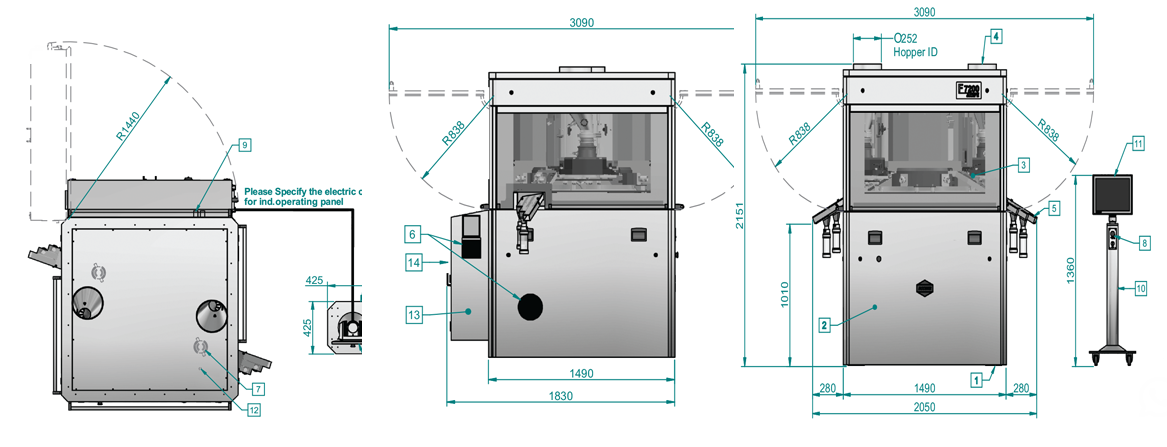The rotary tablet compression machine is a cornerstone of modern pharmaceutical manufacturing, offering efficiency, precision, and high-speed production of tablets. This type of machine is indispensable for large-scale production, enabling manufacturers to meet the increasing demand for high-quality tablets. Beyond the pharmaceutical sector, these machines are also utilized in the nutraceutical, chemical, and food industries.
In this article, we’ll explore the workings of a rotary tablet compression machine, its key features, advantages, and frequently asked questions.
What is a Rotary Tablet Compression Machine?
A rotary tablet compression machine is an advanced piece of equipment designed to compress powder or granules into tablets. It operates on the principle of continuous rotation, using multiple sets of punches and dies to produce tablets rapidly and consistently. This design allows for high-speed production, making it a preferred choice for industrial-scale manufacturing.
How Does a High-Speed Tablet Compression Machine Work?
The operation of a high-speed tablet compression machine involves several stages:
- Powder Feeding: The powder or granule mixture is fed into a hopper, which ensures a steady and consistent supply to the die cavities.
- Die Filling: The rotating turret brings the dies under the feed frame, where they are filled with a measured amount of powder.
- Compression: As the turret rotates, the punches compress the powder within the dies. The upper and lower punches apply the necessary force to form the tablets, and the compression force can be adjusted based on tablet specifications.
- Ejection:Once the tablets are formed, the lower punch pushes them out of the die, and they are collected for further processing or packaging.
This continuous cycle allows the machine to produce thousands of tablets per hour, ensuring efficiency in large-scale manufacturing.

Key Features of an Industrial Tablet Compression Machine
- Multiple Punches and Dies: A rotary tablet compression machine features multiple sets of punches and dies, allowing for the simultaneous compression of numerous tablets, greatly increasing production speed.
- Adjustable Compression Force: The machine allows for precise control over the compression force, ensuring that each tablet has the desired hardness and thickness, a critical factor in maintaining quality.
- Automated Controls: Modern automatic tablet compression equipment comes with advanced features such as programmable logic controllers (PLC), touch-screen interfaces, and real-time monitoring systems.
- Compact and Efficient Design: Despite their high output, many machines are designed to be compact, making them suitable for facilities with limited space.
- Safety Features: To protect operators and maintain quality, these machines are equipped with safety measures like emergency stop buttons, overload protection, and safety shields.
Advantages of Using a Pharmaceutical Rotary Tablet Compression Machine
- High Efficiency: The ability to produce multiple tablets simultaneously allows for faster production, making these machines ideal for mass manufacturing.
- Consistent Tablet Quality: The automated systems in a rotary tablet compaction machine ensure that each tablet is uniform in weight, size, and hardness, crucial for pharmaceutical compliance.
- Flexibility: By changing the punch and die sets, these machines can produce tablets of various shapes and sizes, offering versatility for different formulations.
- Reduced Labor Costs: Automation reduces the need for manual labor, saving time and reducing production costs.
- User-Friendly Operation: The intuitive interfaces on modern machines make them easy to operate, even for less experienced staff, while providing comprehensive data on the production process.
Applications of Tablet Compaction Equipment
- Pharmaceutical Industry: The primary use of these machines is in the pharmaceutical sector, where they compress medicinal powders into tablets efficiently and with precision.
- Nutraceutical Industry: High-speed tablet compression machines are used to produce vitamins, dietary supplements, and herbal tablets.
- Food Industry: These machines are used to compress ingredients into tablets for candies and dietary products.
- Chemical Industry: The machines are utilized for compressing various chemicals into tablet form for industrial use.





